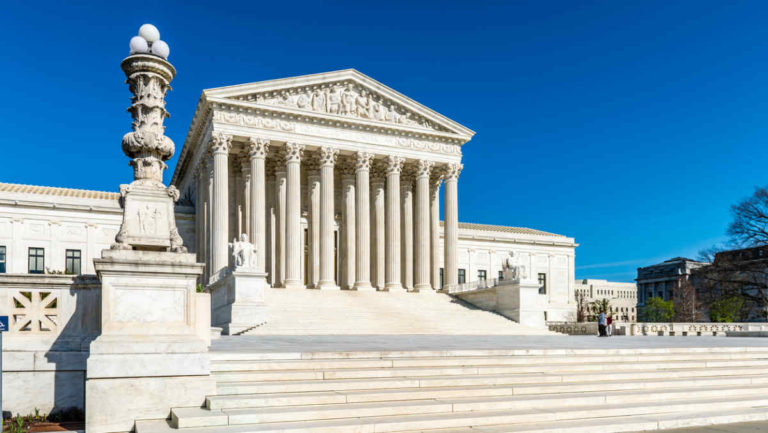

A federal employment law shields workers from discrimination based on sexual orientation and gender identity, according to a landmark U.S. Supreme Court ruling on June 15.
In the most anticipated employment decision of the year, the high court found that an employer who fires an individual merely for being gay or transgender violates Title VII of the Civil Rights Act of 1964.
“An individual’s homosexuality or transgender status is not relevant to employment decisions,” wrote Justice Neil Gorsuch for the court. “That’s because it is impossible to discriminate against a person for being homosexual or transgender without discriminating against that individual based on sex.”
“SHRM applauds the U.S. Supreme Court today for its ruling making clear employment discrimination on the basis of an employee’s sexual orientation or gender identity is illegal,” said Johnny C. Taylor, Jr., SHRM-SCP, president and chief executive officer of the Society for Human Resource Management (SHRM). “The ruling provides much-needed clarity and finality on the Court’s interpretation of Title VII’s protections, giving HR professionals clear guidance and a greater opportunity to create a world of work that works for all.”
JoLynn Markison, an attorney with Dorsey & Whitney in Minneapolis, explained that the ruling makes equal treatment for lesbian, gay, bisexual, transgender and queer (LGBTQ) employees a federal mandate. “Although many states already had laws prohibiting discrimination on the basis of sexual orientation, now all states must provide equal protection to LGBTQ workers,” she said.
“If your employment policies do not currently provide for nondiscrimination based on sexual orientation and gender identity, you should update them to explicitly list those categories,” Markison added.
Definition of ‘Sex’
Title VII prohibits employers from discriminating based on color, national origin, race, religion and sex. In the current cases, the parties disagreed on whether sexual orientation and gender identity are covered under the ban against sex discrimination. The law applies to employers with 15 or more employees.
Two consolidated cases (Altitude Express Inc. v. Zarda and Bostock v. Clayton County, Georgia) addressed workplace protections based on sexual orientation, and R.G. & G.R. Harris Funeral Homes Inc. v. EEOC considered employment rights based on gender identity.
For the sake of argument, the Supreme Court said it would assume that when Title VII was enacted “sex” referred only to biological differences between male and female workers. “Still, that’s just a starting point,” Gorsuch wrote for the court. “The question isn’t just what ‘sex’ meant, but what Title VII says about it.”
Employers may not refuse to hire, discharge or otherwise discriminate against “any individual” with respect to his or her pay and terms and conditions of employment based on the individual’s sex, according to the statute.
“Suppose an employer fires a woman for refusing his sexual advances,” the high court said. “It’s no defense for the employer to note that, while he treated that individual woman worse than he would have treated a man, he gives preferential treatment to female employees overall. The employer is liable for treating this woman worse in part because of her sex.”
With regard to gender identity, the court provided the following example:
So an employer who fires a woman, Hannah, because she is insufficiently feminine and also fires a man, Bob, for being insufficiently masculine may treat men and women as groups more or less equally. But in both cases the employer fires an individual in part because of sex. Instead of avoiding Title VII exposure, this employer doubles it.
“In Title VII, Congress adopted broad language making it illegal for an employer to rely on an employee’s sex when deciding to fire that employee,” the high court said. “We do not hesitate to recognize today a necessary consequence of that legislative choice: An employer who fires an individual merely for being gay or transgender defies the law.”
Chief Justice John Roberts Jr. and Justices Stephen Breyer, Ruth Bader Ginsburg, Elena Kagan and Sonia Sotomayor joined the majority. Justices Samuel Alito Jr., Brett Kavanaugh and Clarence Thomas dissented.
“There is only one word for what the court has done today: legislation,” Alito wrote in his dissenting opinion. He said the majority’s decision “arises from humane and generous impulses” but “the authority of [the Supreme Court] is limited to saying what the law is.”
Kavanaugh wrote a separate dissenting opinion. “Under the Constitution’s separation of powers, the responsibility to amend Title VII belongs to Congress and the president in the legislative process, not to this court,” he said. However, he noted, “it is appropriate to acknowledge the important victory achieved today by gay and lesbian Americans.”
What’s Next?
The Supreme Court’s opinion “will have a long-term impact on employers who are subject to Title VII,” according to Elaine Turner, an attorney with Hall Estill in Oklahoma City. Employers that violate Title VII could face costly legal actions, she said.
Employers with less than 15 employees will continue to be governed by applicable state and local anti-discrimination laws. Gig workers who are properly classified as independent contractors, however, generally aren’t covered by anti-discrimination and other laws that protect employees.
“It’s important to understand this decision doesn’t answer every question that may come up,” noted Michael Warren, an attorney with McManis Faulkner in San Jose, Calif.
At the end of the opinion, Gorsuch said some employers may worry that “sex-segregated bathrooms, locker rooms and dress codes will prove unsustainable” but those issues were not brought before the court in these cases.
Gorsuch noted that some employers fear that complying with Title VII may require them to violate their religious convictions. “We are also deeply concerned with preserving the promise of the free exercise of religion enshrined in our Constitution,” he said. “But how these doctrines protecting religious liberty interact with Title VII are questions for future cases, too.”